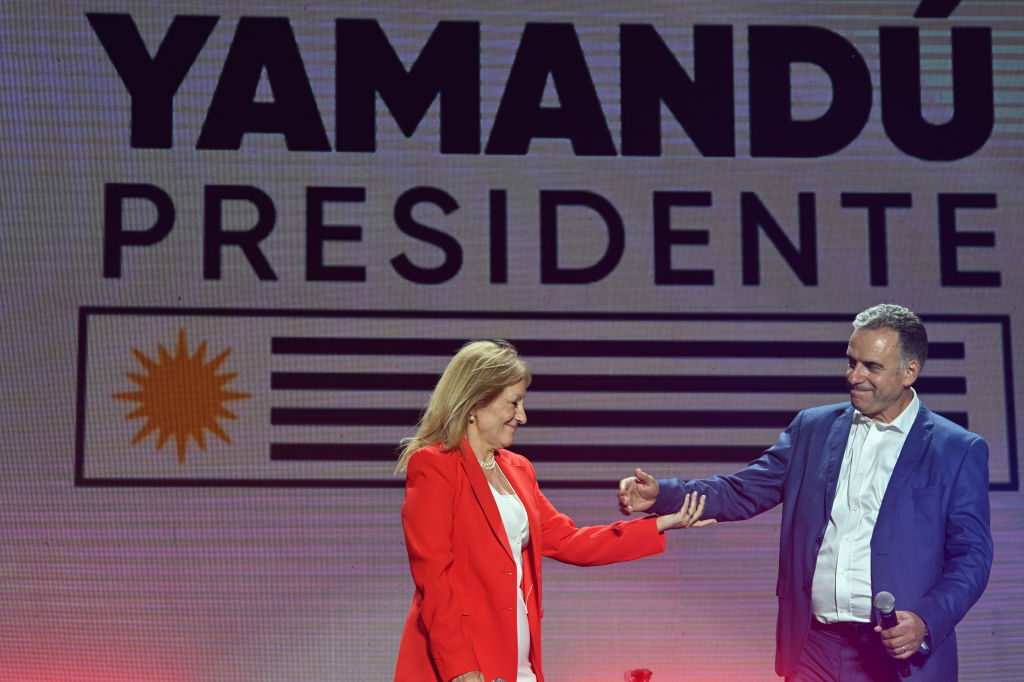Yamandú Orsi of the leftist Frente Amplio secured a 4-point victory against Álvaro Delgado of the governing center-right Partido Nacional, according to the nation’s electoral authority. His victory marks the return of the coalition that governed Uruguay for 15 consecutive years until the 2019 election of center-right President Luis Lacalle Pou.
Orsi, a 57-year-old former mayor of Canelones department, won 49.81% of the vote to beat conservative Alvaro Delgado’s 45.90%, Reuters reported, citing official results. Speaking before followers in Montevideo, Orsi reiterated his promise to lead an open government. “I am going to be the president who calls for national dialogue again and again,” he said. “The country of freedom, equality and also fraternity triumphs once again … Let’s continue on that path.”
The turnout in the nation with 2.7 million eligible voters reached almost 90%, the Associated Press reported. Uruguayans voted with crime, unemployment, and the high cost of living among their top concerns. The November 24 runoff followed a first round and legislative elections held in late October. Neither coalition has an absolute majority in the lower house, but Orsi’s won 16 of 30 Senate seats, potentially positioning his government to pass some key proposals.
AQ asked analysts to share their reactions and perspectives.

Amparo Mercader
Board member, Global Americans
Yamandú Orsi of the leftist Frente Amplio coalition emerged victorious over the governing center-right coalition candidate, Álvaro Delgado. Given President Luis Lacalle Pou’s popularity, these results are surprising and highlight anti-incumbent sentiment. Nevertheless, Uruguay’s tradition of democratic stability remains intact, with both candidates representing moderate positions and emphasizing peaceful governance. This consensus is expected to facilitate a smooth transition of power.
One of the key areas of agreement between the Frente Amplio and the governing center-right coalition is the importance of reducing Uruguay’s fiscal deficit. However, the two camps diverge on how to achieve this goal. Orsi advocates for a stronger state and greater reliance on government procurement as an economic tool. The challenge lies in accomplishing this without resorting to tax increases, a position on which Orsi has been inconsistent. His campaign largely avoided firm commitments to either tax hikes or spending constraints, instead banking on optimistic economic growth projections to generate additional revenue.
Internationally, China remains a critical factor in Uruguay’s economic strategy. With the country heavily reliant on Chinese markets for commodity exports, a slowdown in China’s economic growth poses significant challenges. Moreover, the anticipated opposition of the new U.S. administration to free trade agreements involving China complicates Uruguay’s trade strategy. Orsi, who has expressed skepticism about pursuing bilateral trade agreements outside Mercosur, is expected to take a cautious approach. His administration will likely prioritize maintaining strong ties with China while balancing Uruguay’s commitments within Mercosur and navigating broader global trade uncertainties.
Uruguay’s new leadership is also expected to strengthen relations with Brazil under President Luiz Inácio Lula da Silva, reflecting Orsi’s progressive and regionalist platform. Conversely, his government may take a more measured approach toward Argentina’s libertarian President Javier Milei, given their stark ideological differences. Overall, the election results reaffirm Uruguay’s democratic resilience, highlighting broad agreement on key policy priorities and a peaceful transition of power that reflects the country’s deeply rooted political stability.

Ernesto Revilla
Managing director and head of Latin American economics at Citigroup
Investors called this Uruguay vote “the most boring election in the world.” And that is a good thing, considering the volatile and disruptive elections happening elsewhere across the globe. Yamandú Orsi, of the center-left Frente Amplio coalition, won the presidency and will have control of the Senate but not the lower house. This election once again highlighted Uruguay’s strong democracy and the commitment of all candidates to sensible policy and dialogue. The main worry for the economy and markets in this election—the referendum on a pension reform that would have been fiscally compromising—was rejected by voters in the first-round ballot in October.
President-elect Orsi starts from a strong position. Bucking the trend in political polarization seen elsewhere, he called for unity and the continuation of a national dialogue. Delgado, who lost the election, was conciliatory. Meanwhile, Orsi had already announced that his finance minister would be Gabriel Oddone, a respected economist known to market players.
Orsi’s and Oddone’s challenge will be to reaffirm Uruguay’s successful macroeconomic management while also improving life for the part of the population that has been struggling. Indeed, Uruguay has been celebrated for its macro policies as it has brought down inflation, stabilized public debt, and ensured a strong rebound of the Uruguayan economy for 2024 and 2025, despite external and domestic headwinds including the severe drought of 2023.
Uruguay remains a solid investment-grade country, even as others in that group in Latin America are trending down. It also has the lowest sovereign bond spread in Latin America, reflecting its low-risk reputation. However, childhood poverty is unacceptably high at 20%, social mobility and youth employment are too low, and rising crime rates are complicating daily lives as in other parts in the region. Yamandú Orsi’s platform of market-friendly policies with a strong focus on welfare programs augur well for Uruguay’s prospects in what could be a more challenging environment for emerging markets in the coming years.

Verónica Pérez Bentancur
Adjunct professor of political science, Universidad de la República, Uruguay
After the second round of elections, Uruguay turned to the left again. The Frente Amplio (FA) presidential ticket of Yamandú Orsi and Carolina Cosse defeated the Álvaro Delgado-Valeria Ripoll ticket of the ruling Partido Nacional (PN), which was supported by other right-wing parties of the so-called Republican Coalition. While most polls and analysts anticipated a tightly contested race, Orsi obtained more than four percentage points over Delgado.
Orsi won over the candidate of a popular government –President Lacalle Pou’s administration, at the end of his term, has approval ratings of around 50% of the citizenry. However, the administration confronted numerous challenges, including corruption cases and political scandals. Regarding socio-economic issues, while Lacalle Pou’s administration managed to lower inflation, it also diminished the purchasing power of wages, particularly affecting lower-income groups and worsening levels of poverty and inequality. Additionally, the government enacted an unpopular social security reform that faced strong union opposition.
Regarding public security, the punitive measures implemented by Lacalle Pou’s administration have failed to curb the rising homicide rates and the influence of gangs involved in drug trafficking, which have contributed to high levels of violence in various regions of the country.
Orsi’s government will need to address these challenges and respond to the demands of its social bases, particularly the unions, for greater redistribution. While his government will have a majority in the Senate, it will not hold a majority in the Chamber of Representatives, requiring it to secure two additional votes through negotiations with opposition parties.
In comparative terms, the FA’s victory is significant for two reasons. First, it demonstrates that Latin America’s political shift to the right is not a foregone conclusion. More critically, for the first time, the FA won without its historical leaders—Tabaré Vázquez, José Mujica, and Danilo Astori—who have left politics for different reasons. The FA, an organic mass party with a robust grassroots structure, has successfully renewed its leadership. This ability sets it apart from other leftist parties in Latin America, particularly the PT in Brazil and the MAS in Bolivia. From this perspective, Uruguay’s FA has proven to be the region’s resilient leftist party structure.





